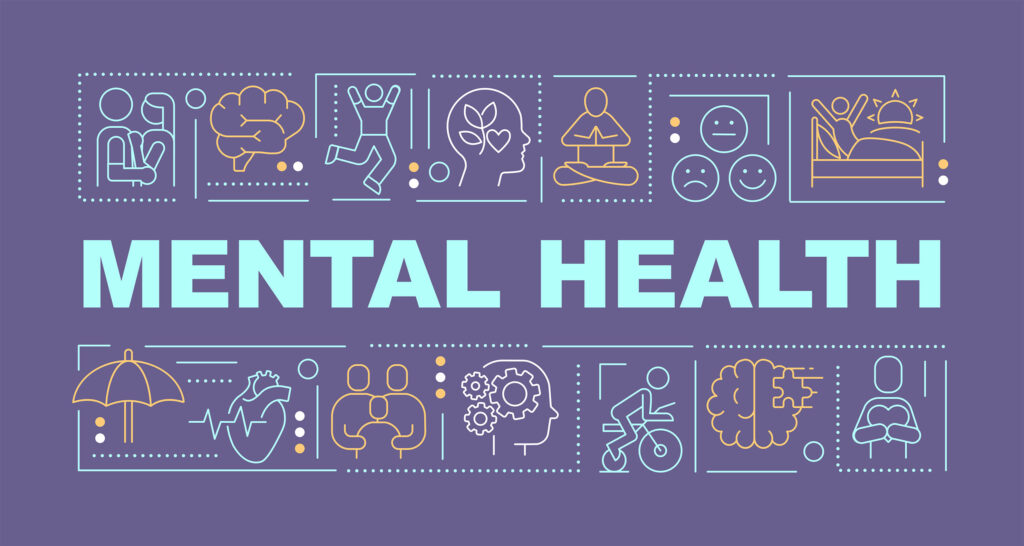Opening the Tricks of Mental Health: A Review of Therapy and Treatment Alternatives
Psychological health and wellness is a complex and important facet of general wellness. Numerous counseling and therapy choices exist to address numerous psychological obstacles. Each approach offers unique benefits and approaches customized to specific demands. Comprehending these alternatives is important for anybody seeking to boost their mental health and wellness. Marriage Counselling. What aspects should one consider when discovering these methods? The answer may expose a course to a much healthier psychological state
Comprehending Mental Wellness and Its Importance
Psychological wellness encompasses the emotional, mental, and social health of people, substantially affecting just how they think, really feel, and act. Its significance can not be overstated, as it impacts every aspect of life, including partnerships, job performance, and overall lifestyle. Individuals with excellent mental wellness have a tendency to deal with anxiety better, maintain healthier partnerships, and make informed decisions. On the other hand, bad psychological wellness can lead to emotional distress, impaired functioning, and different mental disorders, which might need expert intervention. Recognizing psychological health and wellness is necessary for recognizing the indicators of distress and the requirement for support. Awareness additionally advertises compassion and decreases preconception, urging individuals to look for assistance when required. By prioritizing mental wellness, communities can foster environments that sustain psychological well-being, eventually leading to much healthier, more resilient individuals. This foundation serves as a vital action toward effective mental health therapy and therapy choices.
Kinds of Counseling Methods
Counseling techniques vary extensively, each customized to meet the one-of-a-kind requirements of individuals looking for support. Amongst one of the most common kinds are cognitive-behavioral therapy (CBT), which focuses on recognizing and transforming negative thought patterns, and person-centered therapy, which highlights empathy and approval. Psychodynamic therapy discovers unconscious processes and previous experiences to recognize existing habits, while solution-focused short therapy aims to recognize options as opposed to examine problems.Additionally, family members treatment addresses relational characteristics and communication within households, fostering healthier communications. Group counseling gives a communal room for individuals to share experiences and support each other. Various other methods consist of existential treatment, which encourages people to discover meaning and function, and art or songs therapy, which uses imaginative expression as a healing device. Each approach supplies distinctive methods and approaches, enabling customers to discover one of the most suitable approach for their personal growth and recovery trips.
Discovering Different Treatment Methods
In the domain of mental wellness counseling, numerous treatment techniques offer distinct techniques to therapy. Cognitive Behavior modification highlights the connection in between thoughts and actions, while Psychodynamic Therapy checks out subconscious influences on psychological well-being. Additionally, Mindfulness-Based Techniques promote present-moment recognition as a way to enhance psychological law and general mental health and wellness.
Cognitive Behavioral Treatment
Cognitive Behavioral Therapy (CBT) stands apart as one of one of the most extensively practiced and looked into methods in psychological health and wellness therapy. This approach concentrates on the interconnection between actions, sensations, and ideas, highlighting that altering unfavorable thought patterns can bring about boosted psychological well-being and behavior changes. CBT is structured, normally involving a minimal variety of sessions, and intends to outfit people with practical abilities to handle their symptoms. It is efficient for a range of conditions, including anxiety problems, anxiety, and post-traumatic anxiety disorder. By utilizing methods such as cognitive restructuring and exposure therapy, CBT cultivates resilience and equips clients to face challenges head-on, making it a useful choice in the landscape of psychological health therapies.
Psychodynamic Treatment Methods
Psychodynamic therapy strategies provide a deep exploration of the subconscious mind and its impact on actions and psychological well-being. Rooted in Freudian theory, these methods highlight the significance of early youth experiences and unconscious conflicts. Via techniques such as free organization, dream evaluation, and transference, individuals get understanding right into their ideas and sensations, promoting self-awareness and understanding. This therapeutic method urges clients to reveal repressed feelings and unresolved concerns, which can be pivotal in addressing present psychological obstacles. By taking a look at the interplay in between present habits and previous experiences, psychodynamic therapy aims to advertise psychological recovery and personal growth. Inevitably, it gives a framework for people to explore complex inner characteristics that affect their mental health.

Mindfulness-Based Methods
While typical therapies often concentrate on past experiences, mindfulness-based methods prioritize present-moment understanding as a path to emotional wellness. These approaches, including mindfulness-based cognitive therapy (MBCT) and mindfulness-based tension reduction (MBSR), motivate people to involve totally with their ideas and feelings without judgment. Practitioners find out to observe their frame of minds, promoting a greater understanding of psychological triggers and actions. This technique not only alleviates symptoms of anxiety and depression yet likewise improves general psychological resilience. By integrating mindfulness workouts, such as reflection and deep breathing, clients grow a feeling of tranquility and quality. Eventually, mindfulness-based methods encourage people to navigate life's challenges with increased awareness and approval, advertising a healthier connection with their ideas and feelings.
The Function of a Specialist or Therapist
An experienced specialist or therapist plays an essential role in sustaining people through their mental health journeys. They give a safe, non-judgmental space where customers can share their sensations and thoughts openly. Cognitive Behavioural Therapy. By employing various restorative strategies tailored per person's needs, therapists assist customers check out underlying problems that may contribute to their psychological health challenges.Therapists use support and tools to manage stress, anxiety, depression, and other emotional difficulties. Their training equips them to recognize patterns in actions and thought procedures, facilitating understandings that bring about personal development. They additionally cultivate a solid restorative partnership, which is vital for effective outcomes.Moreover, specialists remain fully commited to privacy and honest criteria, ensuring a relying on atmosphere. Inevitably, the function of a specialist or counselor is to equip people, urging them to create resilience and healthier coping methods while steering via life's intricacies
Just how to Select the Right Therapy or Therapy Option
Selecting the best counseling or treatment alternative begins with evaluating individual demands. It is vital to comprehend individual obstacles and goals prior to discovering different treatment styles. This fundamental action can substantially affect the efficiency of the picked strategy.
Analyze Your Demands
Exactly how can individuals properly assess their psychological wellness needs when evaluating therapy or treatment options? They must mirror on their psychological state and determine certain problems, such as stress and anxiety, clinical depression, or connection challenges. Journaling can be a helpful tool for tracking thoughts and sensations over time. Additionally, individuals might gain from looking for feedback from relied on good friends or household members pertaining to regarded changes in actions or state of mind. It is also handy to assess individual goals for treatment, such as boosting coping skills or gaining understanding right into personal patterns. Lastly, researching numerous therapy techniques and their viability for specific demands can aid in making an educated option. Inevitably, self-awareness plays an essential role in selecting the ideal path for mental wellness support.
Check Out Therapy Styles
While going across the diverse landscape of therapy choices, people ought to consider different styles of counseling to locate this contact form the best suitable for their one-of-a-kind demands. Cognitive Behavior Modification (CBT) focuses on altering unfavorable idea patterns, while Psychodynamic Treatment checks out previous experiences and subconscious procedures. Humanistic strategies emphasize personal development and self-actualization, fostering a supportive environment. Furthermore, mindfulness-based therapies cultivate present-moment recognition, assisting psychological law. For those looking for structure, Solution-Focused Quick Treatment targets details goals and remedies. Group therapy supplies a communal setup for common experiences and support. Ultimately, individuals should mirror on their preferences, convenience degrees, and particular obstacles, ensuring they pick a therapeutic design that resonates with their personal trip toward mental well-being.
Overcoming Barriers to Seeking Aid

The Benefits of Counseling and Therapy for Psychological Wellness
Looking for help for psychological health and wellness obstacles can cause significant renovations in general health. Counseling and therapy give people with a safe area to explore their feelings and ideas, promoting self-awareness and individual growth. These professional services equip customers with coping approaches and analytic abilities tailored to their unique situations.Moreover, treatment can decrease signs and symptoms of anxiety, depression, and various other psychological health and wellness disorders, improving psychological durability. Routine sessions promote responsibility and urge individuals to set and achieve personal objectives. Via numerous therapeutic modalities, such as cognitive-behavioral therapy or mindfulness techniques, clients find out to reframe unfavorable thoughts and establish healthier behaviors.Additionally, the restorative relationship itself can be a resource of support, assisting to fight isolation and solitude. Generally, participating in counseling and therapy is a proactive step towards attaining mental health, enabling individuals to lead more meeting lives.
Frequently Asked Concerns
How Much Time Does Therapy or Treatment Typically Last?
The period of counseling or therapy varies substantially, commonly lasting from a few sessions to numerous months or years. Factors affecting this include the individual's certain needs, the kind of therapy, and healing objectives.
What Should I Expect During My Very First Session?
During the very first session, individuals can anticipate this article an intro, discussion of issues, and the specialist's method. They may complete evaluations and develop goals, promoting a safe setting for open communication and building relationship.

Are There Any Threats Related To Treatment?
Treatment can entail risks, such as psychological pain, vulnerability, or facing uncomfortable memories. While these challenges may occur, they can also result in personal growth and healing, making the healing procedure complex yet potentially gratifying.
Exactly How Can I Inform if My Specialist Is an Excellent Fit?
Establishing if a therapist is an excellent fit involves examining convenience, interaction style, and restorative method. Positive rapport and development towards goals are signs of an ideal suit, necessary for effective mental health and wellness assistance.
Will My Insurance Coverage Cover Therapy or Treatment Procedure?
Determining insurance policy protection for therapy or treatment sessions commonly calls for getting in touch with the insurance coverage service provider directly. Policies vary substantially, so individuals need to confirm benefits, co-pays, and any kind of essential pre-approvals before going after treatment services. Amongst the most typical types are cognitive-behavioral treatment (CBT), which concentrates on recognizing and transforming adverse idea patterns, and person-centered treatment, which highlights compassion and acceptance. Psychodynamic treatment discovers unconscious procedures and past experiences to comprehend existing habits, while solution-focused quick treatment intends to identify options instead than investigate problems.Additionally, household treatment addresses relational characteristics and communication within family members, fostering healthier interactions. Other strategies consist of existential therapy, which urges individuals you could try these out to find definition and function, and art or songs therapy, which uses creative expression as a restorative device. Cognitive Behavioral Therapy highlights the link in between habits and thoughts, while Psychodynamic Therapy checks out unconscious impacts on psychological wellness. Cognitive Behavior Therapy (CBT) concentrates on transforming unfavorable thought patterns, while Psychodynamic Therapy explores unconscious processes and previous experiences.
Comments on “Is Cognitive Behavioural Therapy the Right Choice for You? A Self-Assessment Guide”